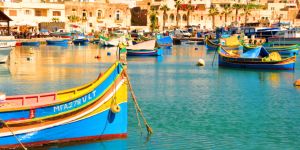@David Vankerkhoven
In general, most countries have a fairly easy route to residence for retirees, when they are over their country's retirement age and are now entitled to a (lifetime) public/state pension. Some are even more flexible, and are indifferent to age, if you have a suitably generous private pension.
You're both young and pension-less, so that will narrow the options considerably.
Luckily, you have savings, so you do have options. If you have a large amount of savings, you may find that it's easy to put some into an asset class that generates a regular (ideally monthly) return, such as a property (rent), a CD (interest), Government/Corporate Bonds (interest), or Blue Chip dividend stocks (dividends). This would be "passive income", and there are countries that allow residence based on sufficient passive income. The challenge is how much evidence they require to support your claim of passive income (3 months of rent/dividends/interest? Or 6? Or the last year?).
I have a few to spring to mind, that might be a good place to start.
Portugal's D7 visa is very popular, and works for retirees and those with passive income (only 700 euros per month). Portugal's beautiful with lovely weather/beaches and is a big draw. Some folks have been accepted with savings only (17k euros), but I don't know if this is still possible. (But easy to find out if you have a quick consult with an immigration attorney.)
Portugal's lovely neighbour, Spain, has a similar option, the NLV (No Lucrativa Visa). This requires 2,500 euros per month in passive income OR 30k euros in savings (proof can be your Canadian bank/brokerage statements, so that's easy-peasy). Spain's great (I'm a legal resident) and the NLV is a very popular and straightforward option.
I'm also legally resident in Bulgaria, a former Communist state (but now an EU member, like Portugal and Spain), and spend most of my time here. It's a surprisingly great place to retire (low cost of living, low cost of property, low taxes, great weather, plenty of mountains and National Parks). It's even getting attention as a destination for Digital Nomads and retirees (see recent Forbes on Sofia, their top pick). Unfortunately, no passive income option, but they have a residence by investment option of only 300k euros. And, they allow this to be invested in property. Even better it can be several properties (e.g. one to live in, and a couple as rental properties).
Bulgaria's non-EU neighbours are Serbia and Turkey. Both very nice options. Serbia allows residence based on owning a property (an inexpensive one is OK), or by having a Serbian company (with company bank account). I'd guess you can get this done fairly inexpensively. Turkey is beautiful and also has fab weather and beaches... it's the poor man's Spain/Portugal. :-) It's even cheaper to live in than Bulgaria, and they have a long term tourist option if you have 6k or so of savings (might be more now). Plus residence through property purchase (I think 200k USD minimum these days).
Central and South American countries are very popular with North Americans (geographically convenient, relatively low cost). I've lived there too, and there are some beautiful spots. Panama has a very popular Pensionado option but it definitely needs a pension. However, Mexico has a residence option through Financial Solvency, with minimum savings of 75K USD. Argentina (I lived in Buenos Aires, and it was a wonderful city, and it's super cheap now if you have hard currency) has the Rentista option. This is typically passive income ($2,500 a month, I think), but I think they also accept you if you plonk $30k in your new Argentinian bank account. Argentina also has a wacky immigration loophole as it's one of the few countries that doesn't really care if you overstay your 90 days tourist visa (well, they care, as there's a fine for overstaying... but the fine is teeny, and it's the same if you overstay for 3 days or 3 years... and if you pay it, they forgive you, and will let you come back in again, no issues at all).
By the way, most of these options won't allow you to legally work in your new country. To do that, you'd probably need a job offer and a different residence visa. However, many folks (even though it's a bit naughty) use these residence options (or even tourist visas), but do a bit of remote working/DIgital Nomading to pick up some extra income.
Happy researching!
 Residence permits in Greece
Residence permits in Greece Work visas for Greece
Work visas for Greece Long-term visas for Italy
Long-term visas for Italy Iqama visa in Saudi Arabia
Iqama visa in Saudi Arabia Resident and work permit for Malta
Resident and work permit for Malta Working Holiday Visa for Taiwan
Working Holiday Visa for Taiwan Work permit in Belgium
Work permit in Belgium Obtaining Permanent Residency in the U.S.
Obtaining Permanent Residency in the U.S.


